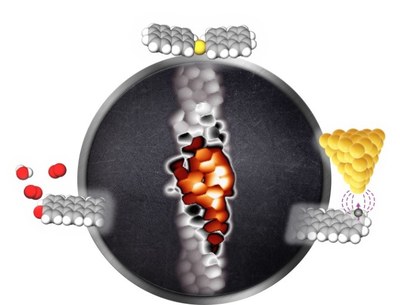On-Surface Synthesis, Reactivity and Magnetism of Graphene Nanoribbons
PhD Program
- Speaker
-
Alejandro Berdonces Layunta
- When
-
2023/06/23
11:30 - Place
- Hemicycle of the Psychology Faculty, Donostia / San Sebastián
- Add to calendar
-
iCal

PhD Thesis defense by Alejandro Berdonces Layunta
Supervisor: Dimas García de Oteyza (CINN, CSIC-UNIOVI-PA, DIPC)
Graphene nanoribbons (GNRs) are one-dimensional stripes of graphene, from which they draw many of their properties. However, the lateral confinement of the GNRs also brings about notable differences. The GNR width and edge shape thus become critical parameters for its ultimate properties, which may display enormously varying bandgaps and even uncompensated spin densities.
Within this thesis, different types of GNRs have been studied. On the one hand, we have studied GNRs with armchair-oriented edges and 5 carbon atoms across their width. In particular, we have assessed their non-conventinal growth mode, as well as their electronic and topologic properties, which endow the ribbons with magnetic end states and make them prone to become oxidized when exposed to oxygen.
On the other hand, we have studied GNRs with chiral edge orientation. Their narrow width renders the ribbons closed-shell semiconducting structures. Nevertheless, their periodically present zigzag edge segments are still unstable to air exposure. A more detailed analysis reveals that they are affected already by low partial pressures of both oxygen and water, the former causing more severe GNR damage. We have therefore devised two alternative strategies to chemically protect the ribbons, but still allowing for their controlled deprotection and back-transformation into the chemically labile structure.
Lastly, we have studied and analyzed the magnetism associated with point defects along the GNRs, as well as the exchange interactions between defect pairs in dependence of structural parameters.

Representative scanning tunneling microscopy image of a point defect along a chiral-GNR. Schemes representing the three main focus points of the thesis, synthesis, reactivity and magnetism.
